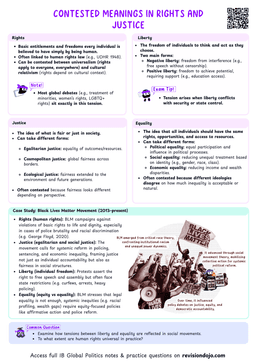Understanding State Legitimacy
Legitimacy
State legitimacy refers to the perceived right of a state to exercise authority and govern its people. It is a foundational concept in global politics, as it determines the stability, effectiveness, and acceptance of a government both domestically and internationally.
Why Is State Legitimacy Important?
- Stability and Order:
- Legitimate states are more likely to maintain social order and prevent conflict.
- Compliance and Cooperation:
- Citizens are more likely to obey laws and cooperate with government policies if they perceive the state as legitimate.
- International Recognition:
- Legitimacy affects a state's ability to engage in diplomacy, trade, and international agreements.
- State legitimacy is not static, it can change over time due to political, economic, or social factors.
Types of State Legitimacy
- Traditional Legitimacy:
- Based on historical customs and long-standing practices.
- Example: Monarchies like Saudi Arabia, where the ruling family's authority is rooted in tradition.
- Charismatic Legitimacy:
- Derived from the personal appeal and leadership qualities of an individual.
- Example: Nelson Mandela's leadership in South Africa, which inspired widespread support.
- Rational-Legal Legitimacy
- Based on a system of laws and institutions.
- Example: Democracies like Germany, where legitimacy is grounded in constitutional processes.
- The 2015 Paris Climate Agreement illustrates the concept of collective action in global governance.
- Despite representing a significant diplomatic achievement with 196 signatories, its non-binding nature demonstrates the tension between state sovereignty and global cooperation on transnational issues.
Sources of State Legitimacy
- History and Tradition:
- Tradition helps legitimize authority by setting long-standing norms and expectations.
- Monarchies often gain legitimacy through historical continuity, where a dynasty’s long rule makes its authority seem natural and accepted.
- Ideology
- Governments can gain legitimacy when their beliefs align with those of the population.
- Citizens tend to support leaders who uphold and advocate for shared ideological values.
- Growth and Development:
- Economic growth, job creation, and improved living standards can strengthen a government's legitimacy.
- Social and environmental development, long-term planning, and strong public services (like healthcare, education, and law enforcement) also build trust and reinforce legitimate leadership.
- Representative Democracy
- In representative democracies, citizens elect officials to make decisions on their behalf.
- Legitimacy comes from the mandate given through regular, free, and fair elections.
- Citizens trust elected representatives to act in their best interests.
- Accountability is built into the system, leaders who fail to deliver can be voted out, maintaining the legitimacy of the democratic system.
- When analyzing state legitimacy, consider both domestic and international perspectives.
- A state may be seen as legitimate by its citizens but not by the international community, or vice versa.
Challenges to State Legitimacy
- Corruption and Inequality:
- Undermine trust in government institutions.
- Authoritarianism and Repression:
- Can erode legitimacy if citizens perceive the state as oppressive.
- External Interference:
- Foreign interventions or support for rival factions can delegitimize a government.
- The Syrian Civil War highlights the fragility of state legitimacy.
- The Assad regime's use of violence against civilians eroded its domestic legitimacy, while international actors were divided over its recognition.
State Legitimacy in Rwanda
- Background:
- Rwanda's government, led by President Paul Kagame, is often praised for economic development and stability.
- Performance Legitimacy:
- The government's success in rebuilding the country after the 1994 genocide has bolstered its legitimacy.
- Challenges:
- Critics argue that political repression and lack of democratic freedoms undermine procedural legitimacy.
- Identify three key factors that contribute to state legitimacy.
- How do these factors interact in different political systems?
Theoretical Perspectives on State Legitimacy
- Realism:
- Focuses on the state's ability to maintain power and security. Legitimacy is secondary to survival.
- Liberalism:
- Emphasizes the importance of democratic institutions and rule of law in establishing legitimacy.
- Constructivism:
- Views legitimacy as a social construct shaped by norms, values, and identities.
- How do cultural perspectives influence our understanding of state legitimacy?
- Consider how different societies prioritize stability, democracy, or economic performance.
- Evaluate:
- How do different types of legitimacy interact in a specific case study?
- Analyze:
- What are the implications of declining legitimacy for a state's stability and international relations?
- Reflect:
- How does state legitimacy relate to broader concepts like sovereignty and power?
- Avoid assuming that legitimacy is solely based on democratic processes.
- Authoritarian regimes can also achieve legitimacy through performance or ideological appeals.


